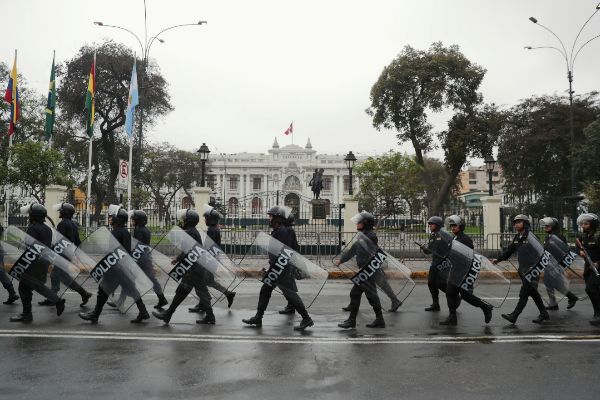- Peru: Vizcarra dissolves the Peruvian congress "constitutionally" and calls for elections
- Peru: Keiko Fujimori is transferred from prison to a clinic for coronary problems
An unprecedented political crisis in recent decades broke out in Peru on Monday, after President Martín Vizcarra constitutionally dissolved the Congress and a faction in rebellion voted for the "suspension" of the president and sworn to Vice President Mercedes Aráoz. The long, tense and convulsive day that the country lived has left a lot of political wounds open to resolve, great uncertainty about what will happen in the immediate future and little certainty about the legal situation and the political consequences of many of the decisions They were taken.
Only the joy and sense of relief that the vast majority of the Peruvian population spontaneously expressed in the streets after the president announced the dissolution of Congress, an agency whose representatives are hated and despised equally by the majority of the people population.
What happened in Peru?
Vizcarra dissolved the Congress and called legislative elections for next January 26, applying a constitutional norm that enabled him to close the chamber if it denied a question of trust to the cabinet chaired by Salvador del Solar. The president thus pronounced after Congress proceeded to elect a magistrate for the Constitutional Court despite the fact that the motion of confidence was expressly linked to that process of electing judges , much questioned about the forms and deadlines that were used in his processing
For the president, the congressmen in fact denied with this act the request for trust , even though they later formally gave their support to the government proposal in another parliamentary procedure.
The Congress, dominated by Fujimori and its right and extreme right allies, responded in absentia and accused the president of violating the Constitution for having unduly dissolved the chamber.
With the absence of almost 50 deputies who accepted the dissolution, the remaining faction voted a resolution to "suspend" for "moral incapacity" to Vizcarra and appointed instead Vice President Mercedes Aráoz as "acting president".
How was arrive to this situation?
This crisis is the height of an open conflict between the Government and Congress since the 2016 general elections, which left a parliament dominated by an overwhelming majority by the Fujimorist Popular Force party and the presidency held by Pedro Pablo Kuczynski. Fuerza Popular used its power in the chamber to pressure the Government and to try to "govern from the Legislative" , which caused the rejection of the population.
The corruption scandal of the Odebrecht construction company in the country ended up costing Kuczynski the charge and led to the assumption of his vice president Vizcarra, who faced the charge with the mission of facing corruption that severely affects the entire country. Thus, Vizcarra promoted a series of reforms that confronted him with Congress, identified as an organism penetrated by the scourge of corruption and who, by act or omission, boycotted several attempts to modify norms and take measures against the corrupt.
To solve the political blockade, Vizcarra proposed in July an electoral advance to renew both the presidency and Congress, a proposal that was nevertheless filed without debate by the Parliament's Constitution Commission, widely dominated by Fujimori. Simultaneously, the opposition congressmen initiated an express and little transparent procedure to renew the judges of the Constitutional Court.
The issue of trust that Vizcarra raised and was discussed on Tuesday was precisely to avoid that maneuver.
What can happen now?
The uncertainty is very wide. Neither party recognizes the other and everything seems to indicate that it will end up in the hands of the Constitutional Court, which will ultimately have to be elucidated if Vizcarra did well to interpret as denied the request for trust given the actions taken by Congress . Meanwhile, there seems to be no interest in evicting the congressmen who remain in Congress.
Nor is there a sense of citizen insecurity, nor fear of military intervention. The media have acted all day with total freedom and continue to do so and no one has been arrested. Vizcarra already called elections to renew the Congress and gave it a date, as the Peruvian Constitution points out.
According to the criteria of The Trust Project
Know more- Peru
- Pedro Pablo Kuczynski
CourtsThe Court dismisses the appeal of Camps and orders the former Valencian president to judge for 'Gürtel'
EEUUTrump to Zelensky: "I want you to do us a favor"
Politics Mazón reaches out to Puig but demands more "forcefulness"

